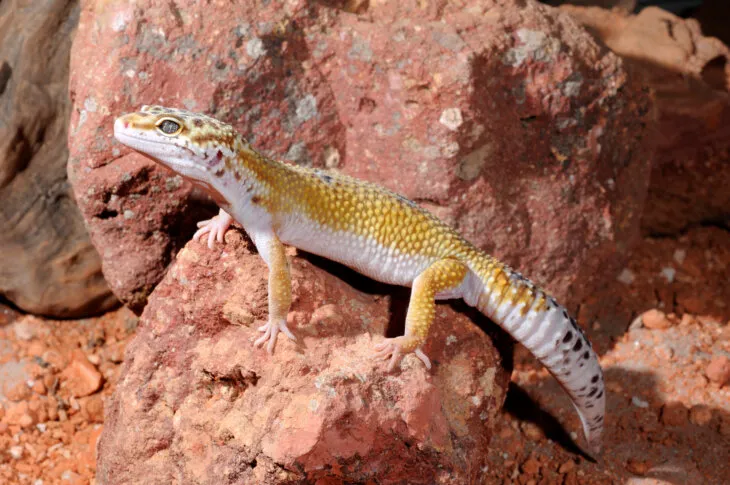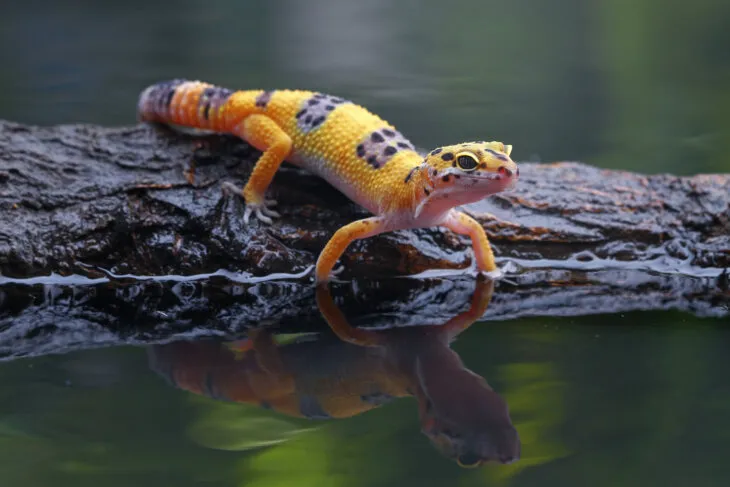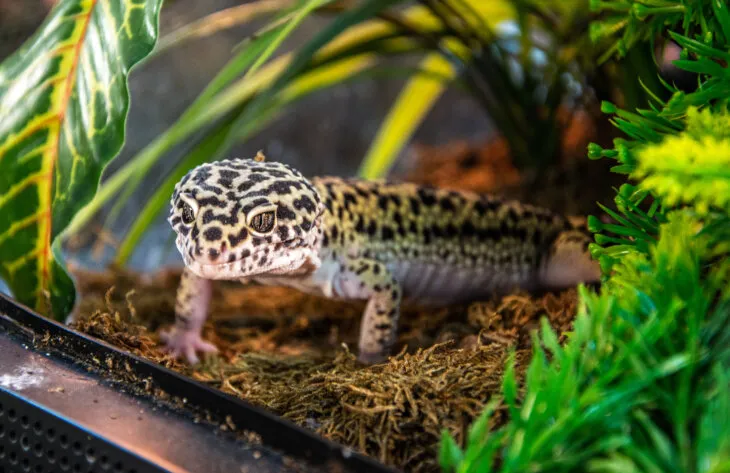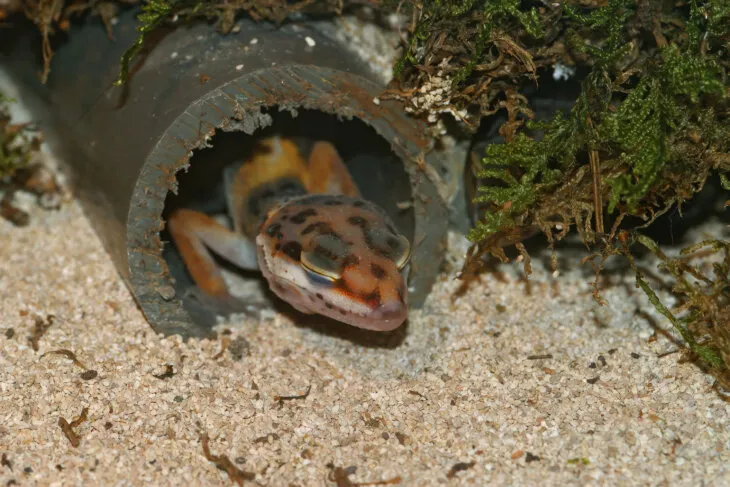
In the wild, leopard geckos get their vitamins and minerals from water, and lick them directly off plants, roots, and rocks. Pet leopard geckos can’t do this – so which vitamins do your geckos need, and how often?
Captive leopard geckos need 6 different vitamins. You should provide general multivitamin supplements, and pure calcium enriched with vitamin D. They should have calcium and vitamin D with most feeds, but their vitamin schedule depends on their life stage.
In this article, we have teamed up with Dr. Sarah Pellett MRCVS, a specialist exotic vet, and Pete Hawkins of The Reptile Networks, to give you the best guide to the vitamins that leopard geckos need.
We also include a detailed vitamin schedule for geckos at different life stages, so you can be sure you have all the information you need to manage your leopard gecko’s diet.
Table of Contents
What Vitamins Do Leopard Geckos Need?
A leopard gecko needs two types of vitamins for optimum health: fat-soluble vitamins and water-soluble vitamins.
Fat-soluble vitamins
These vitamins can be stored by the gecko in their fat stores, and used whenever they are needed. These include:
- Vitamin A – essential for thick skin and good eyesight
- Vitamin D3 – key to absorbing calcium and maintaining healthy bones.
- Vitamin E – for healthy skin and shedding
- Vitamin K – important for blood clotting, but is usually produced by the gut bacteria.
Water-soluble vitamins
These vitamins can’t be stored in the body, so your leopard gecko needs a supply in their
- Vitamin B – this is a large group of vitamins that are involved in digestion and maintenance of the body
- Vitamin C – important when sick, and for keeping mouth disease at bay.
What Types of Vitamin Supplements Does A Leopard Gecko Need?

Getting the balance of all these vitamins right is difficult, but fortunately, you don’t have to buy each one separately and work out the levels!
On the other hand, your pet reptile’s system is complex and a single supplement won’t cover it. Here are the main groups of supplements that you will need to familiarize yourself with.
Multivitamins
Multivitamins are a combination of vitamins that are needed by your body. Geckos have their own set of specific vitamin requirements, and there are plenty of multivitamin supplements especially prepared for reptiles, leopard geckos included.
They usually come in the form of dust supplements suitable for dusting insects that are going to be fed to the geckos.
You will need to provide your leopard gecko with multivitamin supplements, with or without calcium and vitamin D3. Most of the reptile-specific supplements have all the vitamins that leopard geckos need.
Vitamin D3
You may be aware that your leopard gecko needs calcium. If you’re hesitant about the potency of the supplements, the feeding schedule, the benefits and the risks of overdose, we have a full leopard gecko calcium guide that can put your mind at rest.
But calcium intake won’t be any good if there isn’t any vitamin D3.
Vitamin D3 is a fat-soluble vitamin that is essential for the absorption of calcium and phosphorus. Without vitamin D3, your gecko won’t be able to absorb the calcium. Vitamin D3 also aids immune function.
Calcium and vitamin D are essential for strong bones, proper formation of nerve impulses, and muscle activity and control.
Calcium is also necessary for eggshell formation, so female breeding geckos need more of this supplement.
Vitamin A
Another important vitamin for leopard geckos is vitamin A. This makes the geckos’ skin tougher and thicker, while also helping their immune system and maintaining healthy eyesight.
Most good multivitamin reptile supplements have beta-carotene included in their content. This is a precursor to vitamin A, so your leopard gecko can generate as much vitamin A as they need from the beta carotene.
If you are feeding a supplement with beta carotene in, you don’t need a separate vitamin A supplement.
Vitamin E
Vitamin E isn’t always needed for geckos, however, it is essential if your gecko only eats crickets in their diet.
If you are only feeding your gecko crickets, there is a risk of selenium toxicity. In order to avoid this, use vitamin E oil once a week by feeding your gecko one drop directly into its mouth.
Best Multivitamins for Leopard Geckos

Multivitamin powders usually contain all the vitamins, minerals, carotenoids, and other micronutrients that your leopard gecko needs.
Depending on your preference, they can include calcium and vitamin D, or you can supply these separately.
Most exotic pet owners prefer to have all the needed vitamins in one product. Others want to have more control over the gecko’s diet, so they choose the latter option.
Another thing to note is that your supplement powder shouldn’t contain high levels of vitamin D3. Keep it around 45,000-50,000 IU/kg.
At this concentration, you can pinch the supplement powder and dust your feeder insects without any fear of a vitamin D3 overdose.
To make it easy for you, all the products mentioned in our list of supplements are within the recommended Vitamin D3 per kg dosage.
A Summary of the Best Multivitamin and Calcium Supplements
Now, let’s move to some of the best multivitamin and calcium supplements for leopard geckos out there.
We’ve made this list of the top 10 best multivitamin and calcium supplements. The products are from EarthPro, Rep-Cal, ZooMed and Repashy – all companies that specialize in reptile
Our specialists recommend you to get your supplements from one company only, since their lines of products are done in a way that individual supplements complement each other.
This way, you can ensure a diverse, healthy feeding diet for your leopard gecko.
EarthPro Products
Dr. Sarah Pellett recommends that her clients use the Arcadia EarthPro products when it comes to gecko
EarthPro-A
This is a full spectrum supplement for all kinds of exotic pets, leopard geckos included. It contains calcium powder, mineral clay, amino acids, carrot powder, algal carotenoid, vitamin B complex, and bee pollen.
This supplement powder is suitable for every type of feeding.
EarthPro CalciumPro Mg
This supplement is a calcium, phosphorous, and vitamin D3 combo. It also contains magnesium to aid healthy, strong bones. This is suitable for feeding on every fourth meal.
EarthPro Revitalise D3
This is an ultra-fine powder rich in vitamins A, D3, and E. It’s suitable for every 8th or 16th feed for geckos that have UV and heat systems. If you don’t have UVB lights, it can be given to your leopard gecko every 2nd or 3rd meal.
Earth-Pro ShedSupport
The ShedSupport line is perfect for the shedding season for reptiles. It contains a higher dosage of B vitamins, plant-based vitamin E, and bee pollen. It helps the skin during shedding while nourishing new skin.
Rep-Cal multivitamins
Rep-Cal multivitamins are a reptile
Herptivite from Rep-Cal contains beta carotene only, without vitamin A, and will completely eliminate the possibility of vitamin A overdose for geckos. This brand also offers a 100% calcium product for your leopard gecko.
Zoo-Med
The following are some excellent products from the brand Zoo-Med, which has everything you need to make sure that your leopard geckos have a healthy life.
Zoo-Med Repti Calcium
This supplement is a calcium powder of calcium carbonate. You can buy it in 2 different sizes, as well as in 2 different forms. One is the Repti Calcium without vitamin D3, and the other option is calcium along with vitamin D3.
This product doesn’t have any heavy metals or impurities. Also, it’s not made from oyster shells, which can have certain impurities and may cause digestive problems for geckos.
Zoo-Med ReptiVite with Calcium
ReptiVite is a completely rich supplement powder that has the right calcium-phosphorus ratio, together with complex amino acids. It’s the perfect option for adult, regular gecko pets.
In another article, we have all the info you need to know about ReptiVite and its benefits. Check it out here.
Repashy
Rapashy is a brand with multiple products that are specific for what your leopard gecko needs. With this brand, you can pick and choose which vitamins your gecko needs so that you don’t give them something that they don’t need.
Repashy Calcium Plus LoD
This is a high-quality supplement with calcium together with other vitamins, minerals, and carotenoids. The LoD stands for low vitamin D3, so it’s safe to offer without risking vitamin D overdose.
If you have a UVB light in your terrarium, this supplement should provide your leopard gecko with all the vitamins it needs.
Repashy Calcium Plus
This option from Repashy is more potent and calcium-rich. It’s perfect for breeding geckos or young mothers. Compared to Repashy Calcium Plus LoD, this one contains more vitamin A, and vitamin D, but less vitamin E.
If you want more in-depth info about the Repashy Calcium Plus supplement, head over to the product review we have on it.
Repashy SuperVite
If you like the Repashy company’s products, but don’t want a supplement containing calcium and vitamin D3, you can go for Repashy SuperVite.
This multivitamin is one of the best available, containing: vitamin A, vitamin D, vitamin E, vitamin K (Menadione), vitamin C (polyphosphate), vitamin B1, vitamin B2, vitamin B5, niacin, vitamin B6, vitamin B12, folic acid, biotin, choline, and beta-carotene.
How To Feed Supplements to Leopard Geckos

There are two ways to add supplements to your gecko’s diet. You must be careful with administering your supplements to avoid any overdosing.
There’s more about this in our next section, where we will provide you with a supplement feeding schedule.
Most reptile-specific supplements have a multivitamin combination which is enough for a diverse and rich gecko diet, but calcium and vitamin D3 are usually administered separately.
Now, the two supplement minerals and vitamins feeding methods:
Dusting
The other way to feed supplements to your gecko is dusting. This involves “dipping” the insect into multivitamin power right before it’s fed to your pet.
Some supplements are specially prepared for dusting, so they have a formula and structure suitable for sticking to the insect.
Follow these steps to dust insects for leopard gecko feeding:
- Find a plastic or glass box with a lid
- Pour some vitamin powder in the box
- Put the insects inside
- Close the lid
- Shake the box or bag with up-down and left-right motions
- Take the insects out and put them on the gecko’s feeding tray
As the gecko eats the insect, it will also ingest the supplement.
Gut Loading
Gut loading is the supplementation method where you feed insects with nutrients and supplements before giving them to your gecko.
The nutrient-rich
Insects that are suitable for gut loading include superworms, mealworms, crickets, locusts, and roaches. Avoid giving gut load to waxworms, silkworms, or hornworms.
You can feed the insects with supplements, apples, greens, cabbage, carrots or even dehydrated dog
Also, there are some pre-made formulas you can use, just to be sure that you give the perfect mix of multivitamins.
Some of the most widely used formulas are Arcadia InsectFuel, Repashy Grassland Grazer, and Repashy Crested Gecko Superblend.
How Often Should I Give my Leopard Gecko Vitamins? – Gecko Vitamin Schedule
How regularly you give vitamin supplements to your gecko will depend on the quantity of the vitamins in the supplements you use.
Supplements with lower quantities of vitamins could be given with every feeding. But generally they are given every second or third feeding.
You should both gut feed and dust the insects that are fed to your leopard gecko. If some meals are not dusted, they still should be gut loaded.
Supplement Feeding of Baby Leopard Geckos (0-4 months old)
Baby geckos should receive
Supplement Feeding of a Youngster, Juvenile Leopard Geckos (5-18 months)
For young geckos that are neither babies nor mature, pure calcium can be given once a week.
A combination of calcium and vitamin D3 should be given twice a week, and multivitamin dusting once a week. Once a week, you can feed your gecko with only gut-loaded insects, without any dusting.
So for youngsters, you feed 5 times a week – twice with calcium and vitamin D3; once only calcium, once only multivitamin, once only with gut-loaded insects.
Supplement Feeding of Mature Leopard Geckos (18 months and up)
Mature leopard geckos need to be fed on alternate days. One of those feedings can be gut-fed and dusted insect with pure calcium; one can be a combo of calcium and vitamin D3. Multivitamins should be given to an adult leopard gecko once a month only.
Supplement Feeding of Mature Breeding Female Leopard Geckos
Breeding female geckos should receive dusted
Summary Table
| Stage | Supplement | Ideal Frequency |
| 0-4 months | Calcium and vitamin D3 | 3X a week |
| Multivitamin | 1X a week | |
| 5-18 months | Calcium and vitamin D3 | 2X a week |
| Multivitamin | 1X a week | |
| Adult (18 months and up) | Gut-fed and dusted insect with pure calcium | 1X a week |
| Calcium and vitamin D3 | 2X a week | |
| Multivitamins | 1X a month | |
| Mature Breeding Female(as Adult, but with these additions) | Dusted | Every feeding |
| Pure calcium | Freely available in bowl |
Leopard Gecko Vitamin Schedule by Arcadia
Dr. Sarah Pellett and Pete Hawkins advise their clients to follow the Arcadia schedule. This involves:
- An EarthPro-A supplement for every feeding.
- On the 4th feeding, enrich the
food with CalciumPro-Mg. - Revitalised3 can be given at feeding 6 or 8.
Symptoms Of Vitamin Deficiency in Leopard Geckos
Vitamin deficiency is a serious problem in leopard geckos. Luckily, there are certain symptoms that will help you diagnose the problem before it’s too late.
Vitamin A Deficiency
Vitamin A deficiency will result in improper shedding of your gecko’s skin, lethargy, and low levels of energy, and might even swell the geckos’ eyes. You can read more about Vitamin A deficiency in our article here.
Vitamin D Deficiency
If your leopard gecko doesn’t get enough vitamin D, they will also have a calcium deficiency. Ultimately this can lead to weakening of the bones (read more on that here).
The signs you should look for if you think that there is calcium deficiency in your gecko are:
- Low appetite
- Twitching of the toes (tremors or spasms)
- Low energy and much less moving
Over time, calcium deficiency can lead to Metabolic Bone Disease (MBD) which is only partially reversible. If not treated, it might even cause death. Signs of gecko MBD are:
- Spine malformation or curvatures
- Bowed legs that can’t be straightened
- Small lumps around the arms, legs, spine, or jaws
- Swelling of the jaws that cause them to not close fully
- Low appetite
- Low energy levels and less moving
- Paralysis
To treat any vitamin deficiency, take your leopard gecko to the vet as soon as possible, and immediately start adding both multivitamins and supplements of the deficient vitamin to its diet.
Symptoms Of Vitamin Overdose in Leopard Geckos

It is possible for your leopard gecko to have too many vitamins. The two most concerning conditions are vitamin D3 and vitamin A overdoses.
Vitamin D Overdose
Vitamin D3 can cause an overdose if not administered properly, because it is stored in the body and can increase calcium absorption. You should not leave vitamin D3 in the
If your supplement is a combination of calcium and vitamin D3, it might cause an overdose since it is stored in the body.
Some exotic pet owners put water-diluted calcium and vitamin D3 in the terrarium and this can lead to too much vitamin D3 intake.
The possibility of vitamin overdose also rises if you have too much UVB light in the
Pete Hawkins recommends the Arcadia Pro T5 ShadeDweller, which is a complete lighting kit for crepuscular species. He shares more useful resources in The Reptile Networks Facebook groups: Reptile Lighting and Gecko Network.
Dr. Sarah Pellet also recommends purchasing a reptile UV index meter to measure UV levels, and ensure they are not too high for your gecko. Albino and hypo-pigmented morphs need less UV than others.
If you suspect vitamin D overdose in your leopard gecko, these are the signs to check for:
- Loss of appetite
- Lethargy and low energy
- Constipation
- Fluid retention to prevent dehydration
- Dehydration
Vitamin D3 overdose can lead to kidney damage or even kidney failure. If you suspect a vitamin overdose, please visit your exotic pet vet as soon as possible. You can check our complete guide for vitamin D3 overdose here.
Vitamin A Overdose
There’s a risk of vitamin A overdose too. This is a rare condition if the gecko takes vitamin A through a multivitamin powder only, but occasionally there may be signs of excessive vitamin A intake.
Signs of vitamin A overdose in geckos include:
- Irregular, dry and scaly skin
- Depression and lethargy
- Dehydration
Conclusion
Providing the right vitamin supplements is an important part of taking care of your leopard gecko. You can choose whether you want to develop your own schedule based on the recommendations, or use a ready-to-go supplement system.
Always monitor your leopard gecko for signs of vitamin deficiency or overdose and take them to an experienced veterinarian if you notice any symptoms.
- Enchi Ball Python: A Unique and Stunning Morph of Python regius - March 27, 2025
- Emerald Tree Monitor: The Enigmatic Green Guardian of the Rainforest - March 26, 2025
- The Egyptian Cobra (Naja haje): A Fascinating Serpent - March 25, 2025
